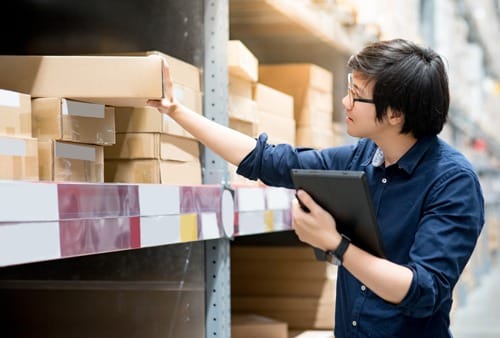Incoming goods inspection: the comprehensive inspection of all goods handled
The optimal flow of goods is not only a prerequisite for operational efficiency, but also indispensable for holistic quality management. Because eventually, it must be ensured that the corresponding goods are actually delivered as agreed – in all their forms and characteristics. Incoming goods inspection is therefore a central aspect of warehouse management.
Why all the effort? Incoming goods inspection to secure warranty and guarantee claims
Let’s take a manufacturing company that works with a large number of different suppliers. The complex product portfolio is based on high-tech and the interlocking of each individual component. Limited functionality, deviating product specifications or processing defects would therefore have an impact on the entire end product. The result would be expensive returns and damage to the company’s image.
The solution: As part of an incoming goods inspection, the transported goods are thoroughly checked and documented in such a way that damage, missing parts, etc. become visible. Typically, the supplier takes part in such incoming goods inspections, if only for preventive reasons.
Here are the most important aspects and advantages of an incoming goods inspection (quality control):
- Possibility to check all goods before final acceptance, including the number, quantity or specification of the product
- Securing any claims for damages or recourse against the supplier
- Basis for refusal to accept goods
- Allocation of goods receipts to own purchase orders (basis for goods receipt notification)
What is important for quality control during the incoming goods inspection?
Subsequent complaints or price reductions, for example due to incorrect or defective performance, require a solid basis. The purpose of an incoming goods inspection is to specifically compare the order and delivery and to document the correct delivery – as well as any deviations.
Incoming goods inspections regularly comprise the following individual steps:
- Checking and reconciling the delivery bill
- Assignment of the delivery to an order/purchase order
- Quantitative testing for type and quantity
- Qualitative testing (especially random samples), if necessary, also individual inspection of the delivered goods
- Documentation of defects and assertion of claims against the supplier
- Receipt of goods on the basis of the incoming goods inspection (if necessary with notification of defects)
- Creation of a delivery note (also: goods receipt note)
In short, everything that needs to be documented for reasons of traceability is checked as part of quality control on delivery. According to § 377 para. 1 HGB (German Commercial Code) the contractor is even obliged to report defects immediately – if he fails to do so, this is legally regarded as acceptance of the goods. The only exceptions are defects that were not recognizable as such during the inspection or in the case of fraudulent misrepresentation (Section 377 (5) HGB).
Further aspects of incoming goods inspection
This is precisely where the importance of efficient warehouse management becomes apparent, as unnoticed defects or incorrect deliveries can hinder the entire production process. Trained, technically skilled personnel are therefore essential for appropriate quality control. Packing lists, handover protocols, customs documents, delivery bills etc. need to be checked carefully. In this way, you can use the incoming goods inspection to secure any warranty rights against the supplier.
Don’t forget: potentially defective individual parts that are unchecked or only negligently checked and find their way into further processing may result in liability for damages to the end customer. For reasons of statutory loss minimization alone, it is therefore advisable to establish modern standards and processes for carrying out incoming goods inspections. It is the quality control required for goods acceptance.
